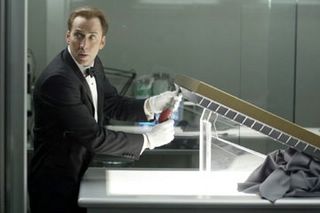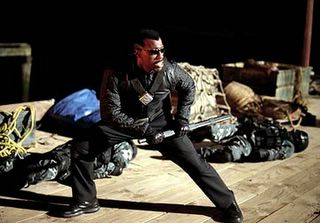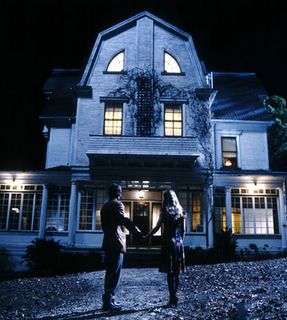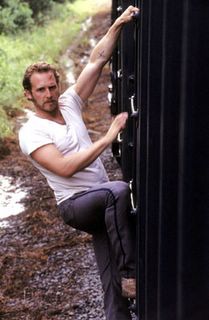The Big Red One: The Reconstruction
In honor of the release of this film to DVD, we're having a big event down at Laser Blazer on Thursday. Tons of people from the cast and crew of Sam Fuller's classic 1980 WWII epic will be autographing the new 2-disc "reconstructed" version of The Big Red One from 7 to 9 pm, including the film's stars, Robert Carradine and Mark Hamill.
Yes, Mark Hamill. You know, from that big, popular movie with a prequel coming out in a few weeks. But that's not important right now.
What is important is that this new version of Big Red One, with 40 minutes of footage added in according to the late Mr. Fuller's own specifications, is an amazing movie. A deeply-felt, impeccably detailed and riveting portrait of war through the eyes of five survivors.
Fuller was a member of the Army's First Infantry Division (the Big Red One of the title), so this is not some academic film based on testimonials or secondary source material. He's telling it as he saw it, and the result brings to mind other classic war films like Platoon, another first-person account of war as directed by a combat veteran.
But unlike Platoon, which incorporates Oliver Stone's trademark impressionism to give the film the visceral impact of a feverish nightmare, Sam Fuller was a stone-cold realist. His movie insists on presenting the facts in an objective, straight-forward matter, and refuses to pull away when the proceedings get disturbing or violent. His frankness, and fondness for acerbic gallows humor, gives The Big Red One the kind of bleak, nihilistic vibe generally reserved for Vietnam films.
I'll confess up front, I'm not familiar with the trimmed-down, 2 hour cut of the film that premiered in theaters in 1980 and has been the offical version of The Big Red One up until the present. I had heard from several sources that the film, though engaging and featuring nice work from star Lee Marvin, was an inessential film, a minor TV-movie-style project from a beloved director. I can only assume this opinion was influenced by a poor edit of this material, or a bad print or transfer.
Because the film I have watched on this new DVD release looks absolutely terrific. Fuller's masterful direction and excellent cinematography by Adam Greenberg, particularly during the film's many combat sequences, give the movie the kind of bold, sure-handed and frequently crafty visual style for which Fuller had become famous.
One sequence in particular, in which the GI's hide in a tunnel in the foreground from Nazi troops on the march in the background is a master class in timing and composition. A German soldier stops in the cave to urinate, with the heroes crouched down just a few feet below, and Fuller has set the camera up to give us the perfect angle on both activities at once. (It reminded me, for some reason, of a similarly masterful shot in Peter Jackson's Fellowship of the Ring, in which the hobbits crouch beneath a tree, hiding from a Ringwraith on the prowl.)
I realize I've gotten quite a ways into this review without discussing the actual content of the film. Very unprofessional of me. The Big Red One doesn't really tell a single, cohesive story. It's more like an anthology of war stories, all of which feature the same five protagonists. These would be four riflemen of the Army's First Infantry and their Sergeant (Marvin). There's Griff (Hamill), who is prone to freezing up during heated combat, Johnson, a naive farm boy (Kelly Ward), Vinci, the sarcastic smart-aleck whose knowledge of basic Italian comes in handy (Bobby DiCicco) and Zab (Carradine), who narrates the movie and, with his trademark cigar on him at all times, clearly serves as a stand-in for Fuller himself. (Although Fuller does actually make a brief appearance in the film, as a war correspondant taking photographs of Italian soldiers).
We follow these men through firefights in North Africa, Italy, France, Belgium, Germany and finally the Czech Republic. They take part in large campaigns, like the Normandy invasion at Omaha Beach, and run smaller operations, such as the destruction of an SP (self-propelled) gun on the Italian front.
The storytelling is similar to the HBO miniseries "Band of Brothers." The war is broken down into individual segments, which give you some sense of the massive scope of the campaign, and the unbelievably stressful work of being a soldier. The extended length of the reconstructed version of the film enhances this notion - the war just seems to go on forever, and any time there's a break in the action, it's painfully brief.
Also like "Band of Brothers," The Big Red One explores the impact of replacement soldiers on the men in combat. The five protagonists are the film's only constant, and as the other soldiers around them are cut down with increasing rapidity, they become increasingly cold and anti-social. What's the point of getting to know the new guy when they'll just killed?
These five main actors all do terrific work here, with Lee Marvin turning in another of his trademark tough-but-fair taskmaster roles and Mark Hamill giving Griff kind of an odd, creepy streak. He had come a tremendous way as an actor since his somewhat unfairly maligned turn in That 1977 Film, and already had developed some gravitas as a performer by the time he made Big Red One.
There's also an interesting performance from Siegfried Rauch as a German sergeant named Schroeder with a demented, slavish devotion to his Fuhrer. We occasionally cut away from the action of the First Squad to look in on Schroeder and his parallel path from North Africa into Europe. Fuller's film is packed with these sort of ambiguous observations. At no point are we asked to sympathize with the Germans, whom Fuller sees as either foolish or mad.
But there is a notion that the job of being a soldier, whether it is for Hitler's Army or America's, is essentially the same. Marvin's Sergeant threatens his men constantly that if they attempt to desert, he will shoot them himself. The Nazi Sergeant makes this very same claim (and follows up on it in a harrowing sequence in the North African desert). Marvin struggles to motivate his men and maintain morale just as Schroeder does on the other side. And when they finally encounter one another, in a startling sequence at the film's conclusion, there is a sense of, if not respect, then at least understanding.
That's certainly more objectivity than you'd get from Oliver Stone, whose Vietcong tends towards the blurry, screechy kamikaze side of the scale.
I can't imagine seeing a condensed verison of this film. Sure, at 160 minutes, it's a lengthy undertaking. But it's such an intense, richly layered and entertaining experience that it's worth the investment of your time. Though there are some minor bumps in the road (particularly an overlong and somewhat confusing sequence set at a French mental hospital), this is one of Fuller's most fully-realized, personal and intriguing works, and one of the greatest modern war films.
And if this all sounds interesting, and you live in the Los Angeles area, why not check in on our event this Thursday at Laser Blazer? Come on by and get your Big Red One DVD signed by a significant number of people actually involved in the film. Just don't bring in any posters from That Other Film, You Know, The One With the Wookies. Cause, seriously, man, you're better than that...







